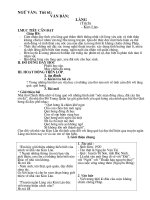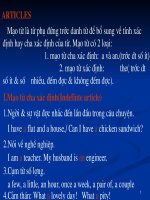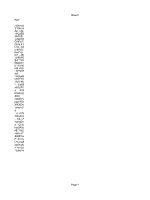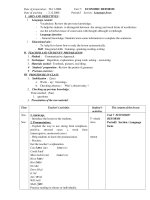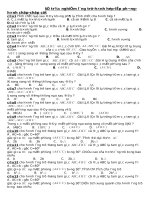u7 lang
Bạn đang xem bản rút gọn của tài liệu. Xem và tải ngay bản đầy đủ của tài liệu tại đây (1.55 MB, 30 trang )
<span class='text_page_counter'>(1)</span><div class='page_container' data-page=1></div>
<span class='text_page_counter'>(2)</span><div class='page_container' data-page=2></div>
<span class='text_page_counter'>(3)</span><div class='page_container' data-page=3></div>
<span class='text_page_counter'>(4)</span><div class='page_container' data-page=4>
Write down as many words that
you have just seen as you can
</div>
<span class='text_page_counter'>(5)</span><div class='page_container' data-page=5></div>
<span class='text_page_counter'>(6)</span><div class='page_container' data-page=6></div>
<span class='text_page_counter'>(7)</span><div class='page_container' data-page=7>
Strong forms Weak forms Strong forms Weak forms
she can [<b>kæn</b>]
they must [<b>mʌst]</b>
you have [<b>hæv</b>]
she has [<b>hæz</b>]
I could [<b>kud</b>]
you do [<b>du:</b>]
[<b>kən</b>] can she
[<b>məst</b>] must they
[<b>həv</b>] have you
[<b>həz</b>] has she
[<b>kəd</b>] could I
[<b>du</b>] do you
I am [<b>æm</b>]
he does [<b>dʌz</b>]
he is [<b>iz</b>]
we shall [<b>∫æl</b>]
they will [<b>wil</b>]
it will [<b>wil</b>]
[<b>əm</b>] am I
[<b>dəz</b>] does he
<b>[iz</b>] is he
[<b>∫əl</b>] shall we
[<b>wəl] </b>will they
[<b>wəl</b>] will it
<i><b>Read the following phrases. Pay attention to how the </b></i>
<i><b>strong and weak form of the auxiliaries are pronounced.</b></i>
*<b>Strong forms</b> are often used in <b>affirmative sentences </b>(Câu khẳng
định)
</div>
<span class='text_page_counter'>(8)</span><div class='page_container' data-page=8>
<b>Practice reading the sentences</b>
<b>1. A: Can you speak English?</b>
<b>B: Yes, I can.</b>
<b>2. A: Must we go now?</b>
<b>B: I think we must.</b>
<b>3. A: Have you met Quang?</b>
<b>B: Yes, I have.</b>
<b>4. A: Has she gone?</b>
<b>B: Yes, she has.</b>
<b>5. A: Shall we go now?</b>
<b>B: I think we ought to.</b>
<b>6. A: Will you come tomorrow?</b>
<b>B: Yes, I will.</b>
</div>
<span class='text_page_counter'>(9)</span><div class='page_container' data-page=9></div>
<span class='text_page_counter'>(10)</span><div class='page_container' data-page=10>
<b>It’s sunny.</b>
<b>He feels cold.</b>
<b>It’s sunny but</b> <b>he feels cold.</b>
<b>Although </b>
<b>Even though</b> <b>it’s sunny, he feels cold.</b>
<b>Though</b> <b><sub>although</sub></b>
<b>He feels cold even though</b> <b>it’s sunny.</b>
<b>though</b>
<b>Adverbial clauses of concession:</b>
<i><b>Usage: </b><b>Although/ Even though/ </b></i>
<i><b>Though </b><b>are used to express </b></i>
<i><b>unexpected contrast.</b></i>
</div>
<span class='text_page_counter'>(11)</span><div class='page_container' data-page=11>
e.g. <b>Although</b> it’s sunny, he feels cold.
e.g. He feels cold <b>although</b> it’s sunny
<b>Although </b>
<b>Though</b> <b>S + V</b>
<b>Even though</b>
<b>Adverbial clauses of concession:</b>
<b>S + V</b>
<b>,</b> <b>.</b>
<b>although </b>
<b>though</b> <b>S + V</b>
<b>even though</b>
<b>S + V</b> <b>.</b>
<i>Common mistake: </i>
<b>Although</b> it is sunny, <b>but</b> he feels cold
<b>In spite of</b>
<b>Despite</b> <b>+ N/ V-ing</b> <b>,</b> <b>S + V</b> <b>.</b>
</div>
<span class='text_page_counter'>(12)</span><div class='page_container' data-page=12>
<b>He tried to finish the book. He was tired</b>
He tried to finish the report <b>although </b>he was tired.
</div>
<span class='text_page_counter'>(13)</span><div class='page_container' data-page=13>
<b>He had promised to come. He didn’t come.</b>
<b>Though he had promised to come, he didn’t come.</b>
</div>
<span class='text_page_counter'>(14)</span><div class='page_container' data-page=14>
<b>Exercise1: Combine the sentences with</b>
</div>
<span class='text_page_counter'>(15)</span><div class='page_container' data-page=15>
1.It rained a lot. We enjoyed our vacation.
2. We had planned everything carefully. A lot of
things went wrong.
3. The doctor has advised him to quit. Bob smokes
20 cigarettes a day.
-> Even though (Although) it rained a lot, we
enjoyed our vacation.
->Although (Even though) we had planned
everything carefully, a lot of things went wrong.
</div>
<span class='text_page_counter'>(16)</span><div class='page_container' data-page=16>
4. It was cold and rainy. We managed to go to class
in time.
5. Luong has studied English only for six months.
He can speak English very well.
6. I didn’t go to bed early. I was really sleepy.
->Although (Even though) it was cold and rainy,
we managed to go to class in time.
->I didn’t go to bed early although I was really
sleepy.
</div>
<span class='text_page_counter'>(17)</span><div class='page_container' data-page=17>
1. ..., I couldn’t sleep.
2. ..., I recognized her from distance.
3. She wasn’t wearing a coat...
4. We thought we’d better invite them to the
party ...
<i><b>I was very tired</b></i>
<i><b>I had never seen her before</b></i>
<i><b>it was pretty cold</b></i>
<i><b>I couldn’t speak the language,</b></i>
<i><b>the heat was on</b></i>
<i><b>I’d met her twice before</b></i> <i><b>we’ve known each other for a long time</b></i>
<b>Although</b>
<b>Although</b>
<i><b>we don’t</b></i> <i><b>like them very much</b></i>
<b>although</b>
<i>A</i>
<i>B.</i>
<i>C.</i>
<i>D.</i>
<i>E.</i>
<i>F.</i>
<i>G.</i>
<i>H.</i>
<i>Complete the sentences using</i>
<i>Although + a clause from the box</i>
Example :
Although ………..……….., he is not well paid
<i>I.</i>
<b>he has a very important job</b>
</div>
<span class='text_page_counter'>(18)</span><div class='page_container' data-page=18>
5. ………., I managed to make
myself understood.
6. ……….., the room wasn’t very warm.
7. I didn’t recognize her ………..
8. We’ve not very good friends ……….
<i><b>I couldn’t speak the language,</b></i>
<i><b>the heat was on</b></i>
<i><b>I’d met her twice before</b></i> <i><b>we’ve known each other for a long time</b></i>
<b>Although</b>
<b>Although</b>
<b>although</b>
<i>A</i>
<i>D.</i>
<i>H.</i>
<i>Complete the sentences using</i>
<i>Although + a clause from the box</i>
Example :
Although ………..……….., he is not well paid
<i>I.</i>
<b>although</b>
</div>
<span class='text_page_counter'>(19)</span><div class='page_container' data-page=19>
<b>Use your own ideas to complete </b>
<b>the following sentences</b>
1. Although we had packed our bags the night
before,
<b>………</b>
.
2. They didn t eat anything although
<b>’</b>
<b>………</b>
..
3. Although Luong hadn t studied English before,
<b>’</b>
..
<b>………</b>
4.
<b>………</b>
, he failed the exam.
</div>
<span class='text_page_counter'>(20)</span><div class='page_container' data-page=20>
<b>Answer suggestion</b>
1.Although we had packed our bags the night
before, we forgot many things.
2.They didn’t eat anything although they were
very hungry.
3.Although Luong hadn’t studied English before,
he could speak very well
</div>
<span class='text_page_counter'>(21)</span><div class='page_container' data-page=21></div>
<span class='text_page_counter'>(22)</span><div class='page_container' data-page=22>
<b>... her doctor's warnings, </b>
<b>Jane continued to smoke.</b>
<b>next</b>
<b>In spite of </b>
</div>
<span class='text_page_counter'>(23)</span><div class='page_container' data-page=23>
<b>I liked the snow... it was </b>
<b>good to get back to some warm </b>
<b>weather.</b>
<b>next</b>
</div>
<span class='text_page_counter'>(24)</span><div class='page_container' data-page=24>
<b>... they are poor, they seem </b>
<b>happy</b>
<b>next</b>
</div>
<span class='text_page_counter'>(25)</span><div class='page_container' data-page=25>
<b>He came to the </b>
<b>meeting... his illness</b>
<b>next</b>
</div>
<span class='text_page_counter'>(26)</span><div class='page_container' data-page=26>
<b>She won ...the fact that </b>
<b>she fell midway through the race.</b>
<b>next</b>
<b>in spite of </b>
</div>
<span class='text_page_counter'>(27)</span><div class='page_container' data-page=27>
<b>Seh bought a car... She </b>
<b>was still too young to learn to drive.</b>
<b>next</b>
</div>
<span class='text_page_counter'>(28)</span><div class='page_container' data-page=28>
<b>I enjoy going to </b>
<b>discos ... I don’t like </b>
<b>dancing.</b>
<b>next</b>
</div>
<span class='text_page_counter'>(29)</span><div class='page_container' data-page=29>
<b>She won the first prize... </b>
<b>she felt disappointed</b>
<b>next</b>
</div>
<span class='text_page_counter'>(30)</span><div class='page_container' data-page=30></div>
<!--links-->

